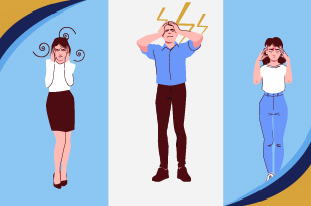Some people in this world get traumatized and later develop PTSD at an older age. This severely disrupts the overall functioning of the affected people.
The following article is probably the best guide for what trauma is, how childhood trauma in adults can ruin an adult’s life, and what are the effective ways to cope with it.
Common Signs Of Post-Traumatic Disorder
Some of the common signs of PTSD are as follows:
- Extreme fear
- Sadness
- Socially withdrawn
- Hopelessness
- Irritability
- Numbness
- Denial of the trauma
- Anger outbursts
- Avoiding people linked with trauma
- Feeling upset in the presence of triggers
- Constantly reliving the event
- Constant vigilance for threats
- Nightmares
- Difficulty in sleeping
What Influences A Child’s Reflex To A Traumatic Event?
Some of the common factors that determine a child’s reaction to a traumatic event include:
Developmental level:
This simply means the point where a child stands age or mind-wise.
Cultural Factors:
This may also affect the child’s perception of what should be expected in a traumatic situation depending on what he or she has observed from people in his or her communities or families.
Available resources:
This refers to the financial connection of the family with the affected person additionally, their access to their daily needs.
Past exposure to trauma:
When a child frequents traumatic events they can grasp control as part of the event that they have become accustomed to.
Read More: Understanding Relational Trauma
What Are The Common Symptoms Of Childhood Trauma In Adults?
Childhood trauma may exhibit ongoing and lifelong effects. Affected adults may experience the following prominent effects of childhood trauma.

Physical Health
Centers for Disease Control and Prevention (CDC) states that if a person has a negative childhood they will surely have a weak immune system. Additionally, there is a positive relationship between chronic health conditions and traumatic events including the most common diabetes and heart disease.
A study performed in 2019 indicates that people who experienced childhood trauma have a higher risk of the below-mentioned conditions in adulthood:
- Heart Disease
- Liver Disease
- Cancer
- Sleep Disturbances
- Autoimmune Conditions
Mental Health
Individuals who undergo childhood trauma also have a high risk of serious mental health conditions in their adulthood, such as:
- Anger Issues
- Depression
- PTSD
- Psychotic Disorders
The United Kingdom National Health Service says that almost 1 in 3 psychologically diagnosed people has a history of childhood trauma.
Relationships:
Toxic stress is one of the most overwhelming mental illnesses and undoubtedly it is caused by the occurrence of childhood experiences.
There was a study conducted in 2017 with newlywed couples as subjects, the results showed that individuals with childhood abuse were more likely to be unsatisfied in their relationships as compared to normal ones.
Substance Misuse:
Teenagers and adults are usually seen doing substance abuse. There can be many reasons, one of them is the Childhood trauma in adults. People having a dark past of childhood abuse or trauma in their childhood are at a higher risk of developing substance abuse behavior as a coping method such as consumption of alcohol and drugs.
Recovering From Childhood Trauma in Adults
Mental health support for adults is available who experienced trauma in childhood. The following are some of the therapy for childhood trauma in adults along with management strategies for adults who once experienced childhood trauma.
Psychotherapy:
Psychotherapy is a type of talk therapy that helps patients share all their concerns with a mental health professional. For trauma specifically trauma-focused cognitive behavioral therapy (CBT) works wonders. It primarily focuses on the way a person understands their thoughts, abilities, and behaviors and develops positive and healthy ways to cope with the negative effects of traumatic events.
Stress Reduction:
A functioning body can aid in reduced stress such as activities like mindfulness, exercise, or other stress-reducing strategies activities can employ a positive effect on the body and mind.
Support:
Social support matters a lot in managing childhood trauma. Spending time with friends, loved ones, and even support groups can help the affected person be less isolated and can aid them in managing the effects of childhood trauma.
A healthy routine:
Sorting out your routine for eating, sleeping, exercising, and performing other activities can assist the affected people cope with the negative effects of the trauma and feel less stressed out.
Read More: Understanding The Different Types Of Trauma
Mental Health Treatment To Manage Childhood Trauma In Adults
Treating childhood trauma in adults is not easy. However, the treatment becomes effective when a combined approach is used. The first-line treatment methods include psychiatric medications, psychotherapy, and coping techniques.
Therapy:
Every person experiences different duration and severity of traumatic experiences and thus requires personalized treatment therapies. Some of the common therapies are:
The most trusted and commonly used therapies involve:
Dialectical Behavioral Therapy (DBT):
This therapy is a complete form of therapy that is primarily used to treat borderline personality disorder. It’s since then been used to treat childhood trauma in adults.
Eye movement desensitization and reprocessing (EMDR):
This is a superior therapeutic approach facilitating the affected persons to process the traumatic memories with the help of ‘bilateral stimulation’, the most usual ones being ‘rapid eye movement’, ‘tapping’, and ‘auditory tones’.
Read More: Trauma Brain Vs Normal Brain: How Trauma Affects The Way We Live
Psychiatric medications:
In some of the victims, psychiatric medication alone is sufficient for treating traumatic memories of the complete event. It is primarily done to stabilize the mental condition of the affected person by using psychiatric medication. For some, medication alone can be helpful to get rid of childhood trauma responses in adults. In some cases, medication can be one of the best forms of Trauma treatment in Adults. Psychiatric medication can help cope with signs of childhood trauma in adults. This is particularly necessary when addressing co-morbid depression, anxiety, or posttraumatic stress disorder.
Some of the common PTSD medications that may aid in decreasing the survivors of trauma:
- Antidepressants
- Antipsychotics
- Mood Stabilizers
- Anti-anxiety medication
Conclusion!
Trauma is an extremely severe mental health issue that disturbs the mental state and way of living of the affected person. Additionally, any childhood trauma can take the shape of a nightmare when it starts affecting adulthood. It badly ruins the social relations and self-image of a person. Some of the common signs include heart disease, liver disease, cancer, anger issues, depression, and PTSD. Some of the most commonly used mental health treatment options are psychiatric medications and psychotherapy. So, if you are also struggling with childhood trauma in adulthood, then is the best time for you to connect with Orange Coast Psychiatry. Regain your mental stability today!
























